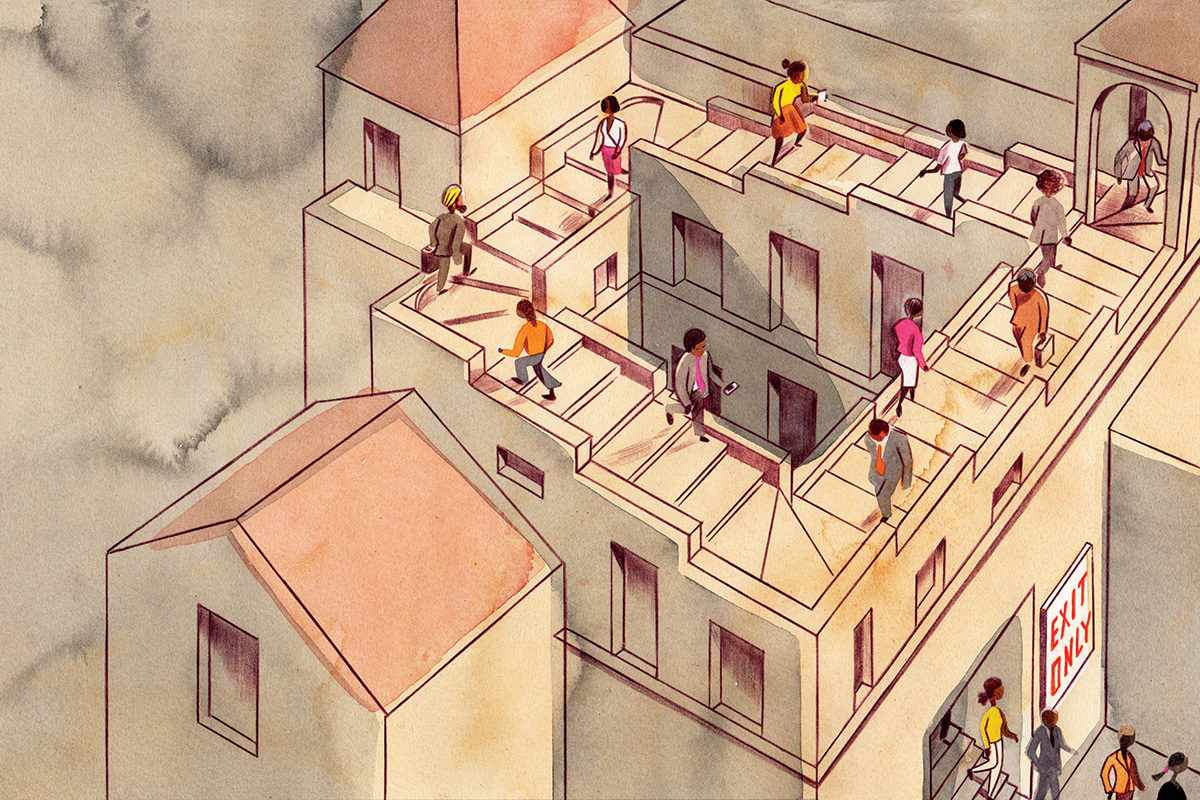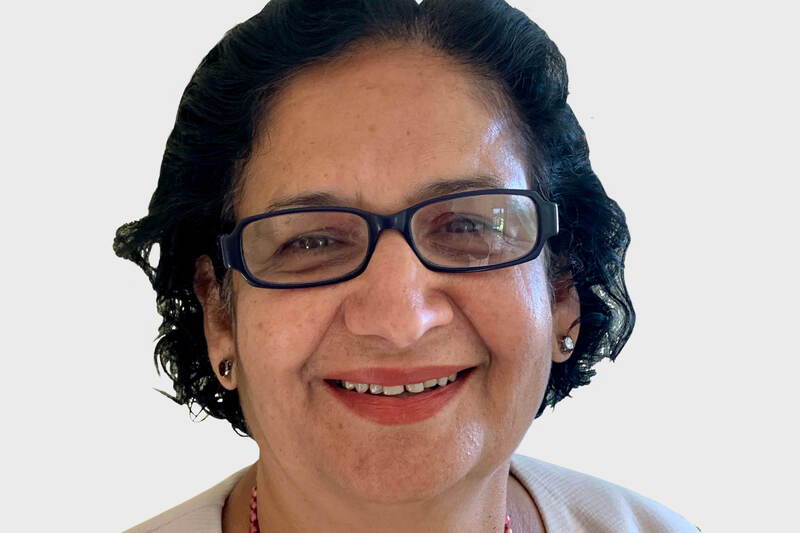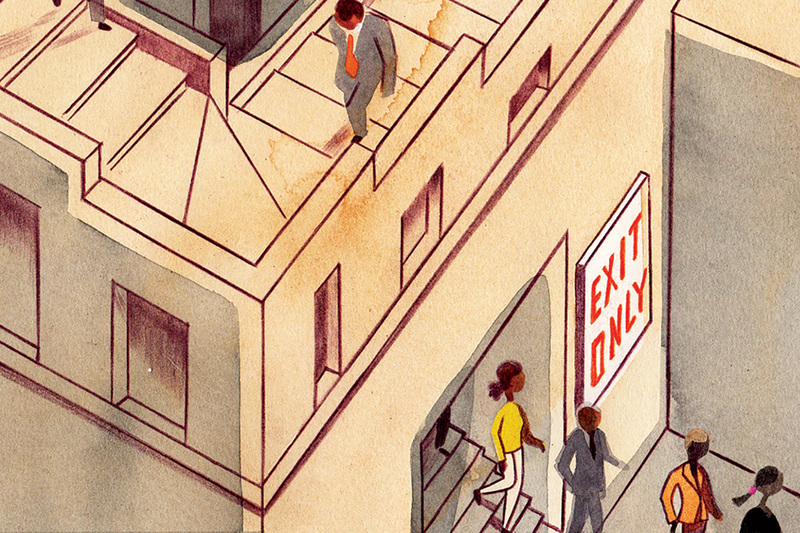You are viewing 1 of your 1 free articles
The housing brain drain
We know that BME people are under-represented in top jobs. Jess McCabe talks to Black and Asian people who have left the sector for their take on what is going wrong. Illustration by Toby Morison
Why is it that if you go and visit many social landlords, you will see numerous Black, Asian and ethnic minority staff in the offices – but almost none in the top jobs? Or, if you want to put it in numerical form, why do two-thirds of housing associations have no BME executives, as our survey in November last year revealed?
One group of people may know the answer. But as far as Inside Housing has been able to find out, no one has systematically asked them before. That is, BME people who have left the social housing sector.
Inside Housing has conducted interviews with many former Black and Asian housing professionals for this story.
“I work for myself, but the salary I’m getting now is nothing like I was getting before. I’ve got my sanity back but they’ve lost a really good brown woman in housing”
The people we spoke to came from various parts of the housing world: from some of the most senior jobs, to more junior staff working across different departments at housing associations, councils, homelessness organisations and housing charities. Many of those who left have gone on to have very successful careers in other industries, in the private sector, in charities and in consultancy.
Even though most of the people interviewed for this feature are no longer connected to the housing world, they were generally motivated by a desire for the sector to do better.
As one person tells us, their message to the sector is simply: “Don’t lose good talent. Don’t lose good Black, brown and minority ethnic talent.”
“I have never once formally spoken up against racism. My solution to it has always been to move on”
What follows is really a story about a brain drain: talented staff who have not been able to progress or make the most of their potential in the housing world, and so have upped sticks and gone on to use those talents elsewhere. Sometimes they have gone elsewhere in order to be able to progress.
Other times, frustration has driven them out of the sector despite the cost. As one woman notes: “I work for myself, but the salary I’m getting now is nothing like I was getting before. I’ve got my sanity back but they’ve lost a really good brown woman in housing.”
Many more will still be working in the housing sector, but at well below their potential.
If you are a senior white manager reading this story, a key message is that just because no one has ever raised an issue of racism with you, this does not mean it is not happening. Few of the people Inside Housing spoke to for this story said they had ever made any official report of discrimination, or that they felt passed over for jobs.
“I have never once formally spoken up against racism. I never thought I would be believed,” one woman tells us. “My solution to it has always been to move on. People move on because they get to a point where you think I don’t want to live with this level of indignity, and lack of respect.”
“I was the only person from a minority background. I was headhunted [to work in the private sector]; I didn’t think twice”
She continues: “I have never known a minority raise an issue about behaviour or discrimination with their manager and it being dealt with – it always led to the minority being exited and branded a troublemaker.” These are the words of someone who has now left to take on a chief executive role in another sector.
Another interviewee, who worked in a back-office job at a housing association, has a similar story. “When you put in a lot of time and effort and are quite passionate about something, and then people don’t believe in you and don’t treat you well, it puts you off. It knocks your confidence; you don’t feel confident,” he says.
“I was the only person from a minority background. I was headhunted [to work in the private sector]; I didn’t think twice.”
Speaking of his new employer, he says simply: “It’s much more diverse – they look after you.”
So what exactly is happening at social landlords to cause such a brain drain of their BME staff?
Most common is indirect discrimination. What does that look like? It can be subtle. Many interviewees – particularly women – told us of attending an external meeting, and people assuming that their junior white male staff were in fact the senior staff members. Another common example is when someone makes a point in a meeting, and it is ignored. Then a white person repeats the same point, and they are congratulated for it.
One Black woman who has worked across many housing associations and councils recalls how she got a new manager, who was a white woman.
“She was always phoning to check where I am, but not phoning up my white counterpart. It starts to make you feel paranoid. It did make me feel undervalued,” she says. Although some may perceive these situations as relatively small, they do add up to create a negative impression of the employer.
It does not go unnoticed that people of colour are not being promoted at the same rate as their white colleagues.
“I’ve won a few awards. When I’ve got to the awards, I’ve gone into that room. There are 500 people in the room and three Black people,” notes one woman who used to work in homelessness, and now has moved to the private sector.
Another interviewee tells us: “I’m very conscious of senior Black people I know who have been consigned to the wilderness, not being considered able enough to lead the bigger organisations. I decided to leave the sector to become my own boss.”
One person who has now moved into a leadership role outside of housing says: “When I joined the sector in the early 90s, there were quite a lot of us. Twenty years later they had all somehow been exited or left. I personally did well – I progressed. But I didn’t expect to be a minority for that long – I expected there to be more.
“I’m very conscious of senior Black people I know who have been consigned to the wilderness, not being considered able enough to lead the bigger organisations. I decided to leave the sector to become my own boss”
“Every single person of colour that I interacted with had some very difficult stories to tell. I would hear over and over again of opportunities not being given. Someone has left or gone on maternity leave, the next obvious person on that team [is BME], [but] they would almost never be given the job – it would immediately go to advert, and of course it always made it more difficult to rise. Over and over again [white] people would be given those opportunities – they would be allowed to act up, or just given the job.”
Another Black, female former housing professional, who is still looking to work in the sector in housing management, says: “It was hard to get to a senior level – I got in but as short contracts. They recruit you, but on a short-term level. I didn’t get the opportunity to apply for any permanent roles. I found it was quite frustrating. I have been actively looking for permanent roles.”
Some of the people Inside Housing spoke to for this story had been on interview panels and observed unconscious bias influencing decisions on who to hire or promote.
“I’ve sat on some interview panels. I’ve walked out of one or two of them because of the manner in which people are looked at and chosen,” one woman tells us. “People start talking about ‘fit’.”
Another Black woman who used to work in housing says: “I was dealing with the recruitment side and I was on the panel, and there was an Asian man who came in, and he wasn’t looking eye to eye. The head of service said, ‘He hasn’t got interpersonal skills.’ Everyone’s got a different culture. It might be [considered] a bit too rude if you are staring.”
In numbers
66.1%
Proportion of landlords with no BME representation on their executive team
40.3%
Proportion of landlords with no BME representation on their board
6
Number of BME chief executives (out of 62 respondents)
Source: Inside Housing diversity survey 2019
Many of the initiatives aimed at increasing diversity in top jobs in housing focus on developing a ‘pipeline’ of talent. This normally takes the form of a training or mentoring programme. A prominent example is Leadership 2025, which sees participants take part in an intensive nine-month programme.
Not everyone is keen on this approach, however. Davina Boakye – who worked in senior roles in housing before starting her own consultancy – is one. “We’re always in perpetual development for the senior jobs,” she says. “In London and the South East, where I have worked, no one can tell me they can’t find talented BAME people. We are there, no one can tell me we’re not. If you go looking, you will find them.
“If you are unable to attract quality candidates to your boards or senior management teams, there’s a reason for that. If we are reluctant to come, it’s because you’ve made it almost impossible for us to get in. Giving myself a headache knocking against doors that don’t want to open isn’t what I want to spend my life doing.”
“If you are unable to attract quality candidates to your boards or senior management teams, there’s a reason for that. If we are reluctant to come, it’s because you’ve made it almost impossible for us to get in”
On top of all these experiences, interviewees spoke to Inside Housing about how they felt conflicted about housing’s reputation as a sector that cares about diversity. Elaine Bowes, who is now a consultant, has worked in the sector since the 1980s. She notes: “The housing sector has got a bit of a history and a legacy of justice and fairness. The Housing Corporation [the former sector regulator] was the first one to make equality part of the regulatory framework.
“At the time, advancements in racial equality happened in housing associations like they didn’t happen anywhere else. So this sector has a veneer of fairness and justice. You wouldn’t walk into any social landlord that doesn’t have an equalities policy. So on the surface, all the right things are there. They still have that legacy and people have that expectation, but really in my experience they’re not any better than anyone else.”
Most people Inside Housing spoke to for this story did not think that housing was worse than other sectors they went on to work in. But in setting out an ambition to do better than other businesses, social landlords created a bigger sense of disappointment when that did not happen.
“Housing associations have made the right noises for a long time, and probably the expectation for me was higher,” says one interviewee.
Another says: “My personal view is, things need to move on from people acting based on how they feel and what they think is the right thing to do. My sense is there is probably a need for organisations to deal with diversity in terms of the behaviour they expect – not by appealing to people’s good nature.”
The sector still has a long way to go. When Inside Housing asked the people interviewed for this story if they would ever consider going back to work for a social landlord, the most common answer was no.
Sign up for the IH long read bulletin
Already have an account? Click here to manage your newsletters















